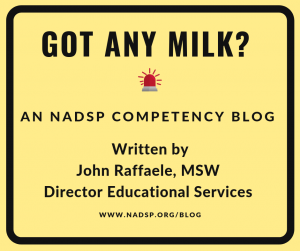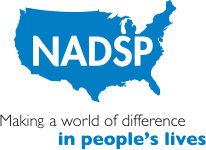 It was a typical morning. Darlene, a direct support professional who works in a supported living apartment complex with four people, heard shouting. Darlene was in an office in the middle of the complex. Darlene recognized the voice. It was Jeremy. Over the last five years Jeremy is person with whom Darlene has worked with and supported. Darlene also heard the tone of Jeremy’s shouts and she knew he was unhappy about his breakfast. It so happens Darlene knows that Jeremy will not eat his cereal without whole milk. Jeremy does not like skim or 2% milk. Darlene immediately went to investigate what was happening and indeed discovered that Jeremy was out of whole milk. Darlene knows that such things can create difficulty for Jeremy because he likes routine, needs to have consistent breakfast food every morning, and has a low frustration tolerance when such things are affected. She helped him calm himself and immediately went with Jeremy to the local store to get milk for his cereal and then return to his routine.
It was a typical morning. Darlene, a direct support professional who works in a supported living apartment complex with four people, heard shouting. Darlene was in an office in the middle of the complex. Darlene recognized the voice. It was Jeremy. Over the last five years Jeremy is person with whom Darlene has worked with and supported. Darlene also heard the tone of Jeremy’s shouts and she knew he was unhappy about his breakfast. It so happens Darlene knows that Jeremy will not eat his cereal without whole milk. Jeremy does not like skim or 2% milk. Darlene immediately went to investigate what was happening and indeed discovered that Jeremy was out of whole milk. Darlene knows that such things can create difficulty for Jeremy because he likes routine, needs to have consistent breakfast food every morning, and has a low frustration tolerance when such things are affected. She helped him calm himself and immediately went with Jeremy to the local store to get milk for his cereal and then return to his routine.
When we hear the word crisis we often think the worse. If one does a Google Search on the word crisis one will find references about negative and bad things. It is not necessarily a happy word. Direct support professionals are frequently associated with crisis. But, crisis situations can be reframed into opportunities. The well- known Yin Yang symbol denotes many things and one of the meanings behind the Yin Yang symbol is, “crisis=opportunity.” Direct support professionals have many “opportunities” when they are supporting people through situations of crisis.
Crisis | ˈkrīsis | noun
- a time of intense difficulty, trouble, or danger
- a time when a difficult or important decision must be made the turning point of a disease when an important change takes place, indicating either recovery or death.
The NADSP Competency Area
The Direct Support Professional should be knowledgeable about crisis prevention, intervention and resolution techniques and should match such techniques to particular circumstances and individuals.
The Skill Statements
![]()
- The competent DSP identifies the crisis, defuses the situation, evaluates and determines an intervention strategy and contacts necessary supports.
- The competent DSP continues to monitor crisis situations, discussing the incident with authorized staff and participant(s), adjusting supports and the environment, and complying with regulations for reporting.
As we review the definition of crisis, and then examine the NADSP Competency Area and supporting skill statements, we see that there is a huge responsibility on the part of the direct support professional to be aware of what a crisis actual consists of. Furthermore, it is a direct support professional’s ability in assessment and communication (two other NADSP Competency Areas) that contribute to both preventing crisis situations and successfully intervening.
Let’s go back to Darlene and Jeremy. In the situation described earlier, it was clear that there was disharmony and potentially negative, perhaps even violent, circumstances about to occur. Darlene, in her knowledge and assessment of the situation and knowing Jeremy’s preferences and routine, understood the crisis and intervened. Darlene and Jeremy would also PREVENT future situations like this through working together to figure out why he ran out of milk and how he can better prepare shopping lists in the future to address this. We cannot un
derestimate how negatively Jeremy’s day can be impacted without milk for his cereal. However, the reality of this situation shows us that Darlene knows all too well that in Jeremy’s history he has been aggressive and had very bad days based on this shortage! As for the opportunity that has come from such a situation, Jeremy and Darlene have developed a way to prevent him from running out of milk so that his morning routines are pleasant. We all like to start our day in our preferred way. Darlene helped Jeremy get his milk that difficult morning and worked with him to plan ahead for his breakfasts in the future so he never runs out again.
This is Crisis Intervention and Prevention.
About the series: The National Alliance for Direct Support Professionals (NADSP) values and respects the great work of the millions of direct support professionals in North America. One important aspect of our organization is our commitment to contributing to the knowledge, skills and values inherent in the work of direct support. The NADSP has given our professional field a validated set of fifteen research-based competencies and a code of ethics, among many other contributions. However, we feel it is important to dive deeper into the importance of what competency truly means for direct support professionals. We have been creating Lunch and Learn webinars to this exploration and we hope it enlightens all who read about the complex skills associated with direct support. Register for the companion webinar by clicking the link here.
